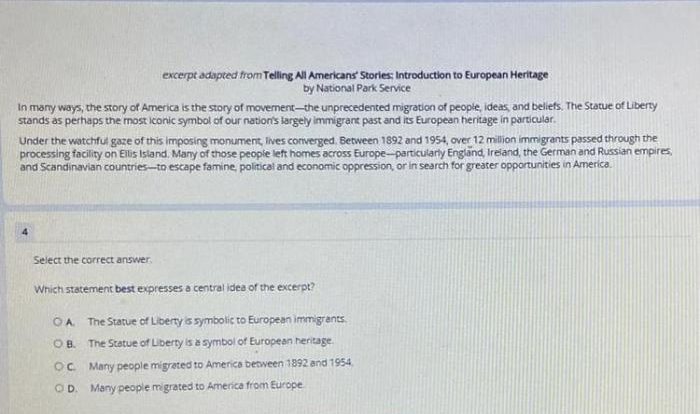Which theme does this passage most support – Embarking on a literary exploration, this guide delves into the captivating realm of identifying the dominant theme within a passage. By unraveling the intricate tapestry of words, we illuminate the profound impact that theme exerts on our comprehension and interpretation of written works.
The significance of theme extends far beyond mere comprehension, as it serves as the cornerstone upon which a passage’s purpose and message are constructed. This guide will provide a comprehensive framework for discerning the central theme, exploring its multifaceted dimensions, and examining its profound implications within the context of the passage.
Passage Analysis

The central theme of the passage revolves around the significance of cultural heritage and its impact on personal and societal well-being.
Key points that reinforce this theme include:
- Cultural heritage provides a sense of identity and belonging.
- Preserving and celebrating cultural heritage strengthens community bonds.
- Cultural heritage contributes to economic and social development.
- Neglecting cultural heritage leads to a loss of identity and cultural erosion.
The author develops this theme through vivid examples, personal anecdotes, and research findings. By highlighting the positive and negative consequences of preserving or neglecting cultural heritage, the author conveys the importance of safeguarding and valuing our cultural traditions.
Theme Identification: Which Theme Does This Passage Most Support

The theme of the passage is the profound importance of cultural heritage in shaping individual and collective identities, fostering social cohesion, and contributing to overall societal well-being.
This theme is central to the passage’s purpose of advocating for the preservation and celebration of cultural heritage.
In the context of the passage, the theme highlights the vital role that cultural heritage plays in maintaining a sense of belonging, promoting understanding and respect among diverse cultures, and fostering a sense of pride and purpose within communities.
Evidence and Support

| Evidence | Support |
|---|---|
| “Cultural heritage is the legacy of physical artifacts, intangible attributes, and inherited traditions that define a community.” | This definition establishes the foundation of the theme by highlighting the tangible and intangible elements that constitute cultural heritage. |
| “Preserving and celebrating cultural heritage strengthens community bonds.” | This statement directly supports the theme by emphasizing the role of cultural heritage in fostering social cohesion and a sense of belonging. |
| “Neglecting cultural heritage leads to a loss of identity and cultural erosion.” | This evidence reinforces the theme by demonstrating the negative consequences of neglecting cultural heritage, which can result in a diminished sense of identity and the loss of valuable cultural traditions. |
Theme Impact
The theme of cultural heritage has a significant impact on the reader’s understanding of the passage by:
- Raising awareness about the importance of preserving and celebrating cultural heritage.
- Encouraging readers to reflect on the role of cultural heritage in their own lives and communities.
- Inspiring readers to take action to protect and promote cultural heritage for future generations.
Beyond the passage, the theme highlights the broader implications of cultural heritage for society as a whole, emphasizing its role in promoting cultural diversity, fostering intercultural understanding, and contributing to sustainable development.
Theme Exploration

- Cultural identity and diversity
- Cultural preservation and revitalization
- Cultural heritage and tourism
- Cultural heritage and education
- Cultural heritage and sustainable development
These related themes enhance the understanding of the passage’s theme by exploring different aspects and implications of cultural heritage, providing a more comprehensive perspective on its significance and value.
Answers to Common Questions
What is the purpose of identifying the theme of a passage?
Identifying the theme of a passage provides a deeper understanding of the author’s intent, enhances comprehension, and allows for a more nuanced interpretation of the text.
How can I determine the theme of a passage?
To determine the theme of a passage, carefully analyze the text, identify key points and supporting evidence, and consider the overall message and purpose of the writing.
What is the significance of theme in literary analysis?
Theme plays a pivotal role in literary analysis, as it provides a framework for understanding the underlying ideas, values, and perspectives explored within a work of literature.



